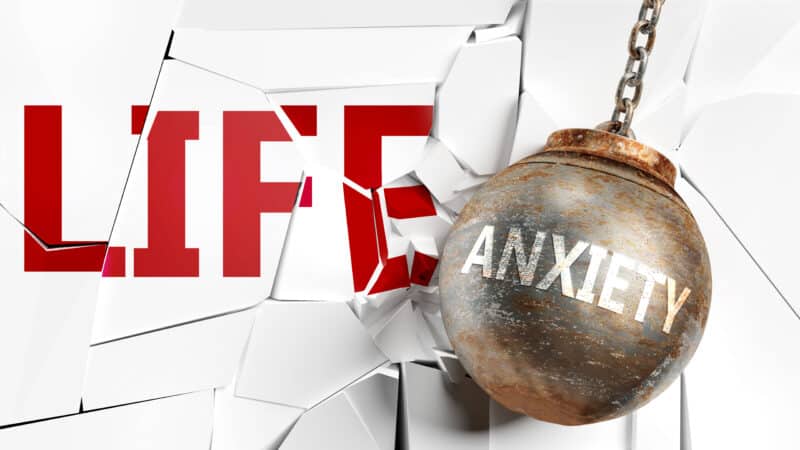CONTROL YOUR ANXIETY WITH THREE PROVEN EXERCISES FROM PSYCHOLOGY
Control Your Anxiety With Three Proven Exercises From Psychology
Control Your Anxiety – By Dr Pat Partington
(Click on the Reference Numbers in Blue for More Info)
Control Your Anxiety – Introduction
You won’t be surprised to hear this, but more people than ever are suffering from anxiety and the simple fact is they don’t know what to do about it. Everyone will feel anxious occasionally, it’s a normal reaction to uncertainty about the future, which is often accompanied by knots in the stomach or a racing heartbeat. Maybe you have an exam tomorrow, a presentation or a difficult conversation that keeps you awake all night with worry. For most people, these challenges pass and they get on with their lives quite naturally, but countless others feel this way all of the time even when no apparent ‘challenge’ is on the horizon.
Our brains can quickly become accustomed to producing the chemistry of anxiety, such that worry, concern and unease become our default setting. We try telling ourselves that we have nothing to worry about, but this only seems to add to the problem and very soon we suspect that there is something more serious going on. Perhaps we should seek help, but this is never the first port of call as research (1) shows that only a quarter of those with anxiety disorders have ever made contact with a health professional. Even worse, the average delay in seeking professional help is six years from the onset of symptoms (2). No, the most natural response to problems of mental health, as with those of physical health, is to fight it.
In this article, I’m going to show you the pitfalls of fighting your anxiety, how it can slow your progress and even strengthen your problem. Then I’ll introduce you to an approach called acceptance that, at first sight, appears to be the polar opposite of fighting, which would be to surrender. However, and as you will see, this would be a gross misunderstanding and simplification of an approach with proven effectiveness in both clinical and experimental settings. I’ll also walk you through three acceptance-based exercises from a technique called cognitive defusion, which will enable you to change your relationship with your anxious thoughts, effectively putting an end to the fight.
These exercises can be applied to performance and sporting anxieties, they are easy to understand and simple to put into everyday practice. What’s more, they don’t require deep introspection or the agony of soul-searching self-analysis. No, getting better doesn’t have to be that difficult. Everything will become clear once you understand the job of your brain.

Control Your Anxiety With Three Proven Exercises From Psychology
Control Your Anxiety – The Job Of Your Brain
“The chief function of the body is to carry the brain around.” Thomas Edison
Have you ever asked yourself the question, what’s the purpose of my brain? No, of course you haven’t and why would you, but if you should ever feel the urge to Google the question you’ll be presented with explanations for the many complexities of human thought, emotion and action. By the way, you are going to see the word ‘complex’ mentioned an awful lot. However, I’m a big believer in keeping things simple and in the spirit of simplicity, let me tell you the purpose of your brain: it’s to keep you alive.
Yes, your brain can do all sorts of wonderful things like solving complex mathematic equations, creating classic literature and imagining beautiful works of art, but survival will always, override these talents. What do you think your brain uses to help out in this constant slog of survival? It uses emotions. Think about it, all emotions have a behavioural outcome, love, anger, fear and anxiety all motivate us to do something. But what’s this got to do with your anxiety? Stay with me.
For most animals this is enough, they sense danger and their brains quickly trigger the fear response that motivates escape behaviour. Then they get anxious in anticipation of similar threats in the future, which motivates avoidance behaviour. Job done. But this is where our similarity with other animals ends, because what we have that sets us apart is the ability to think. When I say we think, I mean we cogitate and contemplate with verbally constructed words and sentences in a style ‘self-talk’ that often ends up like a conversation, or sometimes an argument, in our heads. And herein lies the problem.

Control Your Anxiety With Three Proven Exercises From Psychology
Control Your Anxiety – Your Bullying Thoughts
“The things you think about determine the quality of your mind.” Marcus Aurelius
Thoughts can enter our minds before an emotion or after, depending on the situation, but whichever way it works there’s one thing you can be sure of, the two processes will become stuck together (3). This is called cognitive fusion, cognitive referring to mental processes such as thoughts and images, and fusion relating to the joining of two things to form a single entity. Cognitive fusion is a problem because whenever our thoughts match our emotions they become beliefs, and we then act on our thoughts as if they are factually true.
So our emotions encourage our thoughts to bully us into believing all sorts of things that, in more rational moments, we could clearly see are simply not true. For example, someone with social anxiety might have trouble being assertive, thinking “Nobody is interested in what I have to say”, or “I’m not the sort of person that gets respect from people.” Cognitive fusion ensures that we believe these thoughts completely and, because of this, we act on our convictions by avoiding any situation that would expose us for what we believe ourselves to be. But that’s not even the worst of it.
To make doubly sure that we ‘survive’ our brains actively seek out information to support our emotion-driven theories, something known as cognitive bias. So our brains latch on to any information relevant to the emotion and they delete any irrelevant details. Perhaps you are talking to someone and they quickly glance down at their phone during the conversation even though they have otherwise been fully engaged with the interaction. Your brain will delete the engagement, the comments of agreement and the shared laughter in favour of focusing on the glance at the phone. After all, this is the stone-cold evidence your brain is searching for to support the ‘theory of you’ that it has created.
Think of it this way, your brain wants you to stay anxious because with anxiety comes survival. In fact, your brain actually changes its structure to keep you anxious (4), which ensures an almost constant state of fight or flight, the brain’s ancient safety mechanism. However, the threats of today are not related to the physical dangers that dominated thousands of years ago. No, today we are the safest we have ever been but our brains must continue to seek danger, which is now found in our sense of self: the ways we think about ourselves and what we believe other people think about us.
Whereas once we lived in small communities of people we knew well, we now live in ever-expanding communities of people we hardly know at all, but we nonetheless refer to as friends. Threats to our ‘self’ are now everywhere, but fight or flight takes a different form when the danger presents at the level of our identity. Nevertheless, our urges are so ingrained that taking a combative approach to anxiety is often the most natural response. But is this really the best way to go?

Control Your Anxiety With Three Proven Exercises From Psychology
Control Your Anxiety – Going To War With Your Anxiety
“If you are going through hell, keep going. Never, never, never give in!” Winston Churchill
Have you ever noticed that the language of health and illness is also the language of war? Take the recent pandemic (5), when Boris Johnson, channelling all his Churchillian spirit, commenced hostilities with the announcement, “We must act like any wartime government… this enemy can be deadly, but it is also beatable.” With this call to arms, the prime minister declared war on the coronavirus, a particularly deadly, and unconventional protagonist. The barraged British public, split between science or conspiracy, batten-down or party-on was bombarded with persuasive propaganda from both sides. All the while television newsreel was on never-ending repeat, endorsing the ‘fight’ being waged by those ‘heroes’ on the ‘front-line’, often ‘in the trenches’ and with a dearth of medical weaponry or even body armour PPE.
The history of war metaphors in disease is comprehensive (6) and there is no better example than that of cancer where we are encouraged to ‘fight’, ‘battle’ and ‘never surrender’ to the illness. Described as a “relentless and insidious enemy” (7) that ‘invades’ the body, we retaliate with interventions that ‘kill’ the pain and ‘attack’ cancer cells.
The problem is that such analogies of war can make patients who struggle with either the treatment or the disease feel guilty that they could have “fought” harder. How often have you heard that someone had “lost their battle” or “could fight no longer”, the implications of which are that these people lacked the fighting spirit or the resolve to recover. While metaphors can be useful (8), for example when empowering ‘survivors’, they are problematic for those struggling to overcome illness and their treatment regimes. Problematic metaphors of war are no less an issue when it comes to those with poor mental health.
Wars have winners and losers, and it’s the winners who are the strongest and most resourceful, an attitude that has for too long perpetuated the stigma of mental health. What’s more, the ‘struggle’ of those with poor mental health is different to the experience of physical illness because, when you think about it, this fight is against the enemy within. We are not being attacked by external forces of disease or virus, but by the internal workings of our own minds. This leads to more creative and problematic metaphors with a sinister twist, such as “demons”, “monsters” and “darkness” (9).
You don’t need me to tell you that going to war with monsters requires a whole new armoury, but still we are told, “You can beat this” or, “Stay strong, don’t give in”. So we take that on board and inspire ourselves with, “I’m not going to let this win” or, “I’ve got to keep fighting.” How do you think that’s going to work out for you? Sounds good from a distance doesn’t it, even motivational, which is exactly how it’s supposed to sound, but motivation is a limited resource (10) that becomes exhausted with overuse. The fact is that if you go to war with your anxiety there will only be one winner, and it isn’t going to be you.
Take the self-limiting belief of our earlier example, “Nobody is interested in what I have to say”, which could be transformed into the more confrontational, “I don’t care what other people think” or, “I have to be stronger than this”. However, these thoughts guarantee that your fight will continue because going to war with your mind will feed your thoughts, strengthen them and perpetuate the struggle. Battles can be won as you ‘soldier on’, but the war continues.
We tend to focus on our anxieties, drill down into them and turn them over in our minds to the point where they often become obsessions. Occasionally we fight against them and order ourselves to “Stop thinking nobody’s interested in what I have to say!” However, this results in something called cognitive rebound (11) whereby the act of pushing a thought away causes it to bounce back even harder. I invite you now not to think of a blue tree. Tell yourself “stop thinking about blue trees”. How’s that working out for you?

Control Your Anxiety With Three Proven Exercises From Psychology
Accepting Your Anxiety
“The greatest victory is that which requires no battle.” Sun Tzu
In the world of psychotherapy, cognitive behavioural therapy (CBT) has ruled the roost for well over fifty years (12). Briefly, it proposes a relationship between thoughts, emotions and behaviours, a relationship that is reciprocal but driven primarily by faulty thinking patterns (13). The thought, “Nobody is interested in what I have to say” is not a fact. For a start, it assumes that you know what everybody is thinking, which you don’t. Secondly, it assumes that you have never said anything of interest to another person, which simply isn’t true. I could go on, but let’s just agree that this thought represents a generalisation, the clue is in the word “nobody”. For sure there are times when you have said something that the other person finds uninteresting, but welcome to the world, nobody is perfect.
There’s a relatively new form of CBT known as acceptance and commitment therapy (ACT) (14) and the clue to understanding cognitive fusion’s place in therapy lies in the first word, acceptance. Anxiety and depression bring misery, distress and disruption so it seems counterintuitive to accept that this is now your lot in life. However, acceptance of anxiety is different to putting up with it, giving in to it or bearing the burden uncomplainingly. No, acceptance is about changing your relationship with your thoughts and emotions so they loosen their grip, which means you can move in a more meaningful direction. Returning to our war analogies, acceptance is not about waving the white flag, rather it is the first step in disengaging from your problem.
The best way to show you how acceptance works is to walk you through some cognitive defusion exercises that have been used successfully by ACT practitioners for many years in areas such as food cravings (15), covid-related health anxiety (16) and depression (17). So, these techniques have already worked for thousands of people just like you and all you have to do is read them, understand them and then put them into practice, but not just once, no you are going to have to practice them regularly. As with many things, the more you practice the better you get, but specifically for psychology, the more you practice the more your brain changes to accommodate your new learnings.

Control Your Anxiety With Three Proven Exercises From Psychology
What’s In Your Boat?
In sports psychology, the mantra is ‘control the controllables’ and this is equally relevant to challenges in life more generally. We can learn a lot from top athletes who have this winning mentality, so let me give you an example.
An Olympic champion rower was interviewed about his gold-medal winning performance. The questions went something like this:
“How did you feel when you found out that the US team had been posting record performances in training?”
The Olympian replied: “That’s outside my boat”.
He was asked: “How did you feel when the German team upped their stroke rate for the final third of the race?”
Answer: “That’s outside my boat”.
Try again, “The conditions clearly favoured the home nation, what did you think when…” – “That’s outside my boat”.
You can probably see what’s happening here. The rower has been brilliantly schooled by a sport psychologist to ‘control the controllables’, and it’s been done in a really clever way. He’s been trained to immediately identify things that he cannot control and to quickly verbalise “That’s outside my boat”, a mantra that instantly switches off the emotional centres of his brain and any bullying thoughts that might be fused to it.
“That’s outside my boat!” Say it, mean it, switch off your emotional brain and the bullying thoughts that it generates.
So what’s inside this Olympian’s boat? How hard he trains, how he rests, how he eats and how he performs during the race. Also in his boat are his emotional responses, his thoughts and every single one of his other behaviours. Everything else is outside his boat and he won’t even allow himself to think of them.
Your anxiety bias (18) is going to make sure that you focus on those ‘uncontrollable’ things that are outside your boat, overlooking the things that are inside. But these are the very things that can give your own mental health an essential and meaningful boost, so your approach has to change.
How are you going to respond when you hear yourself saying, “Nobody is interested in what I have to say”? Yes, you are going to quickly remind yourself, “That’s outside my boat.” You have no control of what other people think, it’s outside your boat, so say it to yourself, switch off your emotional brain and move on! Being caught up in what you imagine other people are thinking can only inhibit your own performance, so once you have this strategy in place you can then perform to the best of your ability.

Control Your Anxiety With Three Proven Exercises From Psychology
Tug-Of-War With The Anxiety Monster
Metaphors act as a bridge between the known and the unknown, things that are well understood and those that are poorly understood. They help us to see things in a different context so we can more clearly apply them to our own life experiences. The metaphor of a tug-of-war with the anxiety monster does this beautifully.
Imagine you are in a tug-of-war with an anxiety monster. If you have anxiety you already know how strong and powerful the emotional pull of anxiety can be. Here’s the thing, in between the two of you is a wide, bottomless pit, which this monster is trying hard to pull you into. So you’re putting all your effort into the fight because, of course, you’re terrified of what will happen if you don’t. So it’s you or the monster, the only way to conquer your enemy is to pull it into the pit, and once you have vanquished the monster you can relax. Each time the monster gives a big heave, you instinctively respond with more effort of your own. But it’s draining your energy and obscuring the solution.
The solution? Let go of the rope! When you stop pulling there’s no chance that you’ll end up in the bottomless pit. However, it also means that you can’t get rid of the anxiety monster down the pit. So that means that you are going to have to learn to live with the monster, but when we learn to live with things they stop troubling us. Similar to ‘what’s in my boat’, it’s about accepting the things that you are unable to control and getting on with the things that you value. Your anxiety-biased thinking may not disappear completely, and every so often the monster will throw you the rope. Just ignore it and get on with your life.
So what are you going to say to yourself next time you are doubting your own ability, finding yourself being pulled by the anxiety monster toward the bottomless pit? Yes, the instruction to yourself is simple, “Put the rope down”. Take a deep breath in and smile as you breathe out, reminding yourself that you’re in control.

Control Your Anxiety With Three Proven Exercises From Psychology
The Playground Bully
Imagine a bully in the school playground. The bully is taunting and teasing the kids, stopping them from playing and enjoying themselves. The bully is laughing and criticising three school children in particular, all with the same threats, “You’re stupid and weak – give me your lunch money or I’m going to tell the whole school how stupid you are!” Here’s how the three children react.
The first gets upset, starts to cry and hands over the money fearfully.
The second argues back, “I’m not stupid, I’m in the top class and you’re in the bottom. Go away and leave me alone.”
The third remains calm and doesn’t react to the bully at all. She takes a quick glance of acknowledgement, then turns around and walks off to play with her friends.
How do you think the bully is going to react to each of the children’s responses? Well, the first child is inadvertently rewarding the bully’s behaviour and is now going to get bullied every day. The second child is engaging with the bully, taking him on confrontationally, but the bully isn’t going to give up. No, these two are going to be at it in the playground every so often for the rest of their schooldays. The third child will need to repeat her calm, unresponsive behaviour for a few days, but after that the bully will hardly bother her at all. There’s no reward, no feedback, not even any acknowledgement, so therefore no purpose to the bullying.
The thoughts in your mind are just like that playground bully. You can give in to them, fight them or acknowledge and accept them. Like the school bully, they’ll come back every so often just to check for a response, but your acceptance will make sure the visits become less frequent. So next time you find yourself thinking, “I’m not very interesting”, quickly say to yourself “untrue”, or “false”, or “ridiculous”, or any other short, quick response that will show the bully you aren’t going to get caught up with it all. You have defused your thoughts from your emotional reactions and the more you do this the less anxious you will become, which of course means you can get on with enjoying your life.

Control Your Anxiety With Three Proven Exercises From Psychology
Control Your Anxiety – Conclusion
“We are what we think. All that we are arises with our thoughts. With our thoughts, we make the world.” Buddha
We spend a lot of time looking from our thoughts and very little time looking at them. Our thoughts are fused to our emotions and one will always lead the other, so when we view the world through the lens of faulty thinking our emotions follow quickly behind. It’s very tempting to say this is a bad thing, an unfortunate glitch of a brain poorly designed for meeting the challenges of modern-day living. However, far from being a malfunction, it is actually a supremely effective survival mechanism that has ensured the safety of our species for hundreds of thousands of years. So you could say we should be thankful, which is exactly what Buddhist monks are doing when they practise gratitude meditation, reflecting on the good things, but also the suffering in their lives.
Acceptance, then, is a mindful approach to living with anxiety. It helps us to focus on the present moment as we defuse negative thinking and distance ourselves from unnecessary emotions. It isn’t about surrender or avoidance, rather it proactively meets your anxiety head-on. Take your approach to acceptance as far as you choose, but begin with the cognitive defusion exercises above. Resist the temptation to go to war with your anxiety, save this article, read and practise the exercises regularly and contact me if you need any further information.
“Men are disturbed not by things, but by the view which they take of them.” Epictetus.
